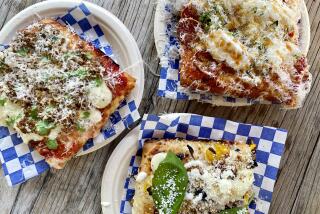How Zoom cooking classes liberated a new breed of students — and their teachers

- Share via
In the last 14 months, we’ve had to get creative about finding new ways to be together and learn new things. Those of us lucky enough to have a strong internet connection and a working computer have triggered an explosion of virtual get-togethers and classes as we do Pilates in our living room, immerse ourselves in college-level courses or fill our fridges with sourdough starter.
Cooking has occupied countless hours of mental energy as well as screen time, whether it involves teaching geographically distant grandchildren how to bake, taking private lessons, making Thanksgiving dinner with family or joining 316 other bakers-in-training who want to learn how to make flaky biscuits.
Some of that surging interest in food preparation has allowed chefs and cooks and caterers whose livelihoods disappeared overnight to put food on their tables and keep body and soul together as they meet their clients on Zoom.
Jocelyn Ramirez, whose L.A.-based catering company Todo Verde specializes in vegan Mexican food, had been keeping very busy with private parties and a weekly gig at Smorgasburg L.A., which brought food trucks to Row DTLA each Sunday. But when the pandemic hit, all catering and events came to a full stop. ”We had just won a bid to be the official vendor at a concert venue but there were no concerts, so we had to pivot,” she said.
Fortunately, Ramirez was about to publish a cookbook, “La Vida Verde,” so at least she had a road map.
“I started teaching classes in my small apartment in L.A.,” Ramirez said. “I had to get a Zoom account and add additional lighting. We were navigating between two screens, a phone and a laptop. … We were learning as we went along.”
Since the early days, Ramirez has improved her lighting and camerawork, and she has been hired for private group classes to celebrate holidays, anniversaries and birthdays. In those situations, everyone has the ability to unmute to ask questions and interact — which can lead to distractions. “If the baby starts crying, everybody is, ‘What’s wrong with the baby?’ I just had to go with it. I try to guide them as much as possible.”
Ramirez had to figure out how to talk with her students, visually check their progress and up her performance game, while making sure she wasn’t burning the tortillas. And she learned what to expect of her students.
“I encourage everyone cooking along to have their mise [en place] ready,” to prepare and measure out all the ingredients ahead of time so once the cooking starts no one has to stop to toast or zest or grind or measure, which can make a big difference with a recipe for a dish that might have 18 ingredients. On the other hand, “For these private classes we’re finding that no one has anything done. They just want to have fun.”
From brunch menus to cocktails, here’s a variety of online cooking classes.
Now Ramirez and many online chefs also offer recipe kits that can be ordered and delivered with all the ingredients necessary to make the scheduled dish, an option much appreciated at a time when a trip to the grocery store loomed as a dangerous outing.
As students gain experience, many of them discover the prep work makes it easier to keep up — the key to a successful outcome — whether they’re cooking with former college roommates scattered around the country or a bunch of strangers from around the world.
That’s where Luca Brozzi and Lorenzo Manfrini come in, teaching how to make ravioli from their home in the hills outside Florence, Italy. Using the recipes from their nonnas, the irreverent couple walk everyone in the class through the process of making fresh pasta.
They’d been renting out their home on Airbnb and teaching in-person cooking classes in their kitchen before the pandemic hit, but February 2020 brought a rude awakening. “We got about 600 cancellations,” Brozzi said. “And we knew things would not be coming back very soon.”
Like so many others, they had to pivot.
Several years ago, Airbnb started an offshoot endeavor that focuses on experiences clients can have once they arrive at a destination. Cooking classes in home kitchens are popular, but once the pandemic hit, those classes, along with so many other in-person tours and lessons, had to be rethought. With the help of their Airbnb partners, Brozzi and Manfrini decided to offer their pasta-making classes on Zoom.
“Cooking for someone is an expression of love. This is why so many Italians are pretty good at cooking,” Manfrini said. “If I cook for you it means that I care for you,” and the duo make their clients feel cared for even at a distance. Every so often they ask students to show their work so they can check how the pasta dough is looking, whether it is ready to roll out or if it’s rolled thin enough. Once the raviolis are made, the chefs say, “Show us your babies,” and students proffer their stuffed treasures in front of their computer cameras.
Each class ends with a little Italian stand-up routine that focuses on the history of Italian food. “Let me just tell you,” Brozzi said, “in Italy there is no such thing as pineapple pizza. Every time someone makes a pineapple pizza, a chef in Italy dies.
“We love our food, our tradition, and some Italians are very serious,” he added. “On the other hand we can laugh about things. You can work but you can also have fun.”
Fun and connection were what Helene Siegel had in mind when she decided to continue the baking sessions she had started in person with her 8-year-old granddaughter, Piper, via Zoom. “I was missing them terribly. It was hard to pin the parents down to chat or Zoom, so it was a strategy to be able to see the kids,” Siegel said. “Piper and I had always enjoyed baking together.” And her younger grandchild, Finn, definitely enjoyed eating the results.
Now she documents the sessions along with a recipe and some memories every other week on her blog, The Pastry Sessions. “I wanted to do it in the most relaxed way so it never feels like a lesson. The main thing is to encourage, not criticize. I can see how much progress she’s made, how much she is now doing by herself. … It’s a marvelous way of connecting with the family. I send the recipe and ingredients early in the week so Joe [Piper’s dad and Helene’s son] gets everything together.
“During COVID, we all needed some structure and something to look forward to,” she said.
Chef Angela-Michelle Jordan (who goes by Angela-Michelle) and mixologist Anthony Baker share their cooking and bartending expertise through Cozymeal.com, which acts as an aggregator of classes for a battalion of independent creatives. In 2014, Cozymeal built a following offering in-person classes on mixology, wine tasting and cooking. These experiences, in cities like Los Angeles and San Francisco, ranged from custom classes at clients’ homes to team-building activities run by corporations. Once the pandemic hit, there was an 80% drop in demand for its classes, so in April of last year Cozymeal moved them online. (The company recently added some in-person classes back into the mix of offerings.)
Baker, a bartender at high-end restaurants for 20 years, began teaching in person when his employer noticed his knack for putting people at ease. He notes that switching to online classes has been an unexpected pleasure and says when the quarantine ends, he will continue to teach online and probably add some in-person classes.
Angela-Michelle began offering cooking classes online and in person through her website, culinarykisses.com, long before the rise of Zoom and other platforms. Once the pandemic made in-person catering, parties and classes impossible, she added to her roster of online classes, offering them on her website, on Cozymeal.com and through Eventbrite.
Joel Gamoran is a longtime veteran of planning and teaching cooking classes. The former head chef at Sur la Table spent 10 years in charge of content for in-store cooking schools nationwide. After he left the chain, Gamoran wrote a cookbook titled “Cooking Scrappy,” which emphasizes zero-waste cooking, and has hosted an A&E series called “Scraps.” In October of last year, Gamoran launched Homemade, a site that offers a wide range of cooking classes, with former Sur La Table executive Ben Rosenfeld. The classes are free, funded by partnerships with companies like Cabot, Imperfect Foods, Earthbound Farm Organic and Breville, whose products the partners believe in.
Homemade’s virtual classes started with 10 or 15 people per event, but attendance has grown into the hundreds. “Someone who is new to the kitchen may not be comfortable spending $29 on a virtual cooking event,” says Gamoran, who turned his garage into a cooking studio with five monitors. “I can see every face. I look for visual cues, thumbs up, thumbs down. They can write in the chat and we have a chef monitoring so we can get back to them in 30 seconds” — which matters when you’re one of 316 people learning to bake flaky biscuits and your dough doesn’t look like everyone else’s.
Homemade students learn to make everything from biscuits to whoopie pies to peanut noodles. There are fee-based classes for private and corporate customers, and Gamoran has partnered with the USO to offer enlisted men and women, who might have access only to a canteen, a free, specialized program that focuses on five-ingredient meals requiring just five tools to prepare them.
Gamoran is convinced that online cooking classes are here to stay. “Once COVID fizzles and the world opens back up, there will be a moment when our business drops a little bit … but ... this is the future. This is me looking at you and helping you achieve your culinary dreams.”
Monika Reti started Hipcooks in Los Angeles in 2004 and had seven studios with in-person classes for adults and kids when the pandemic hit. “Virtual teaching has really worked out well with our mission of empowering the home cook,” she said. “They have to use the equipment they have in their kitchen. If you don’t have whole milk but you have sour cream, you can substitute. People are able to apply their preferences, and we encourage that. Mistakes are often the best teacher ... and with virtual classes, we are not tied to one location. … I’ve had to wake up at 7 a.m. to teach a margarita class to a group in Holland,” she said, laughing.
“I can’t wait to reopen in person when the time is right … to not just teach delicious food but to inspire and bring people together.” But Reti, like the other chefs, is in no hurry to return to only in-person classes. “Virtual,” she said, “is here to stay.”
More to Read
Eat your way across L.A.
Get our weekly Tasting Notes newsletter for reviews, news and more.
You may occasionally receive promotional content from the Los Angeles Times.








